How deep are your pockets?
Why your gum pockets – the spaces that form between your teeth and gums – matter.
What are gum pockets?
If you've ever sat in a dentist's chair, you might have heard the dental professional calling out numbers – “5-3-3” “5-4-5”, etc. – while examining your mouth. They aren't counting your teeth; rather they're measuring the depths of your gum pockets.
Gum pockets are spaces that form between the gums and teeth. Healthy gums have small, non-diseased gum pockets. However, deeper gum pockets can indicate an infection known as periodontitis, an advanced form of gum disease.
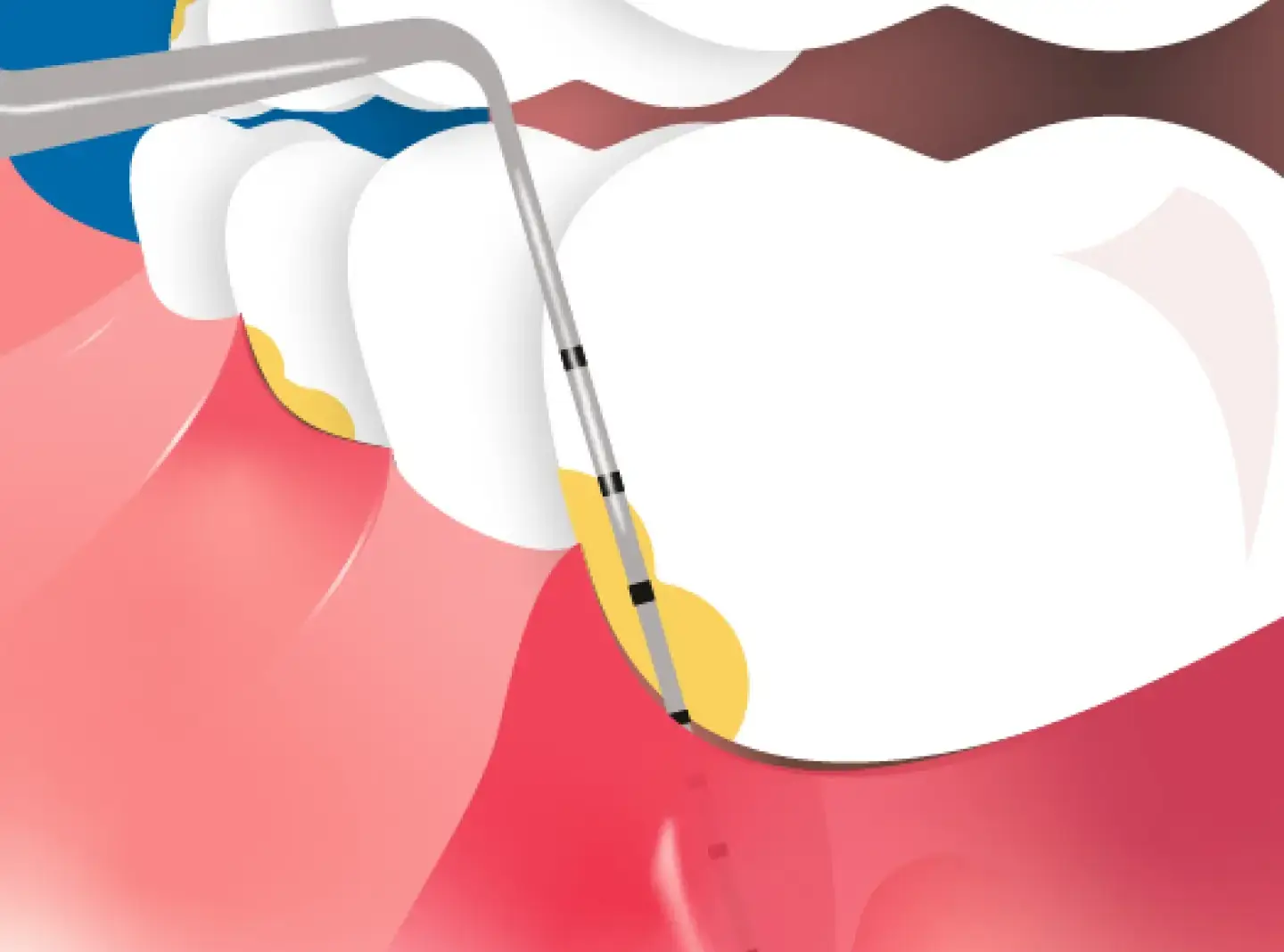
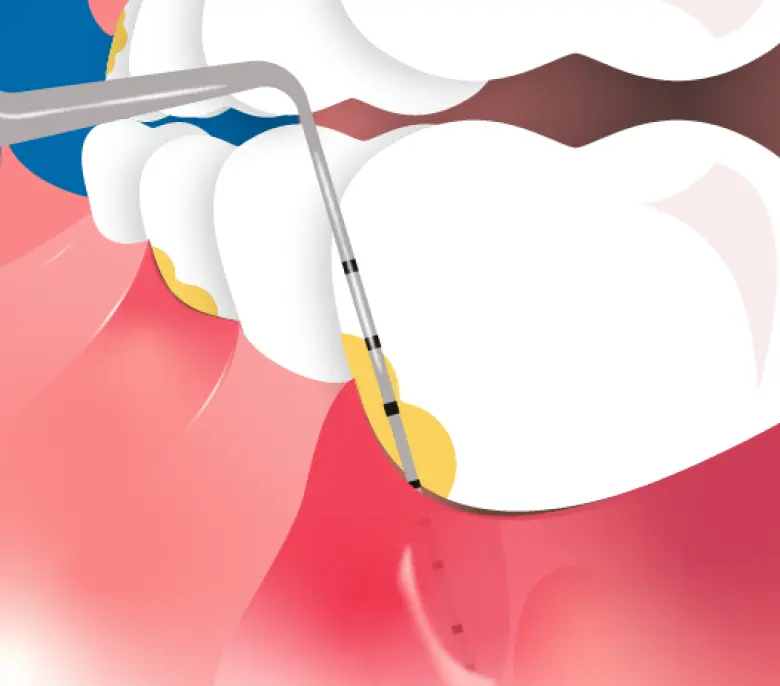
Here’s how these deeper gum pockets can develop:
1 Bacteria Grows
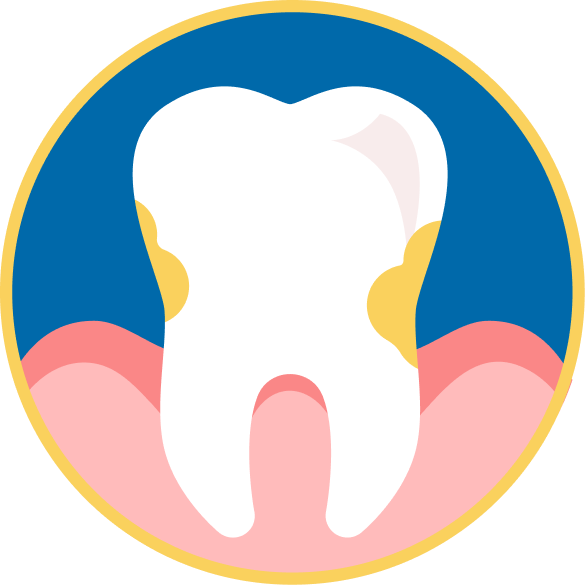
Accumulating bacteria along the gum line can cause gum tissue to become red, swollen, and even bleed, all signs of inflamed gum tissue.
2 Pockets Deepen
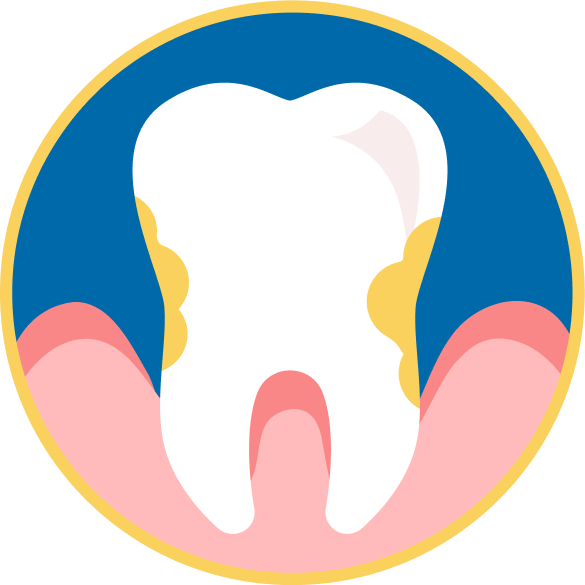
If the bacterial infection is not addressed and progresses to a more advanced form of gum disease (periodontitis), bone loss occurs. Periodontitis is a chronic bacterial infection that cannot be cured, only managed through ongoing monitoring and treatment as needed.
3 Infection Spreads
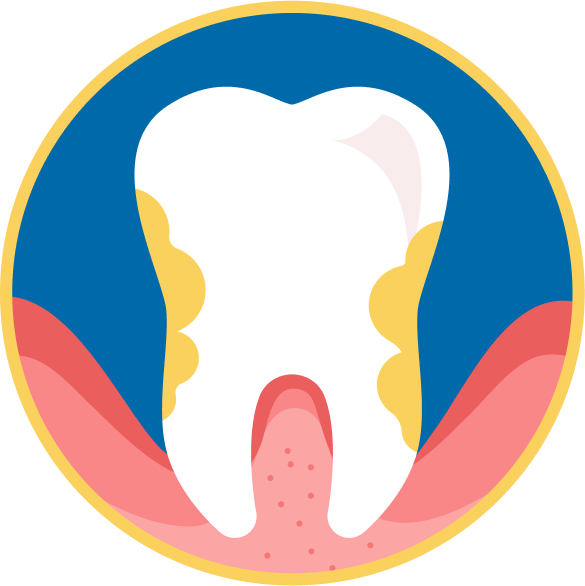
The bacterial infection continues to progress and the gums continue to detach from the teeth. This deepens gum pockets even more and allows bacteria to travel deeper. Infection can spread around the tooth, affecting the gums, connective tissue, and bone, potentially leading to tooth loss.
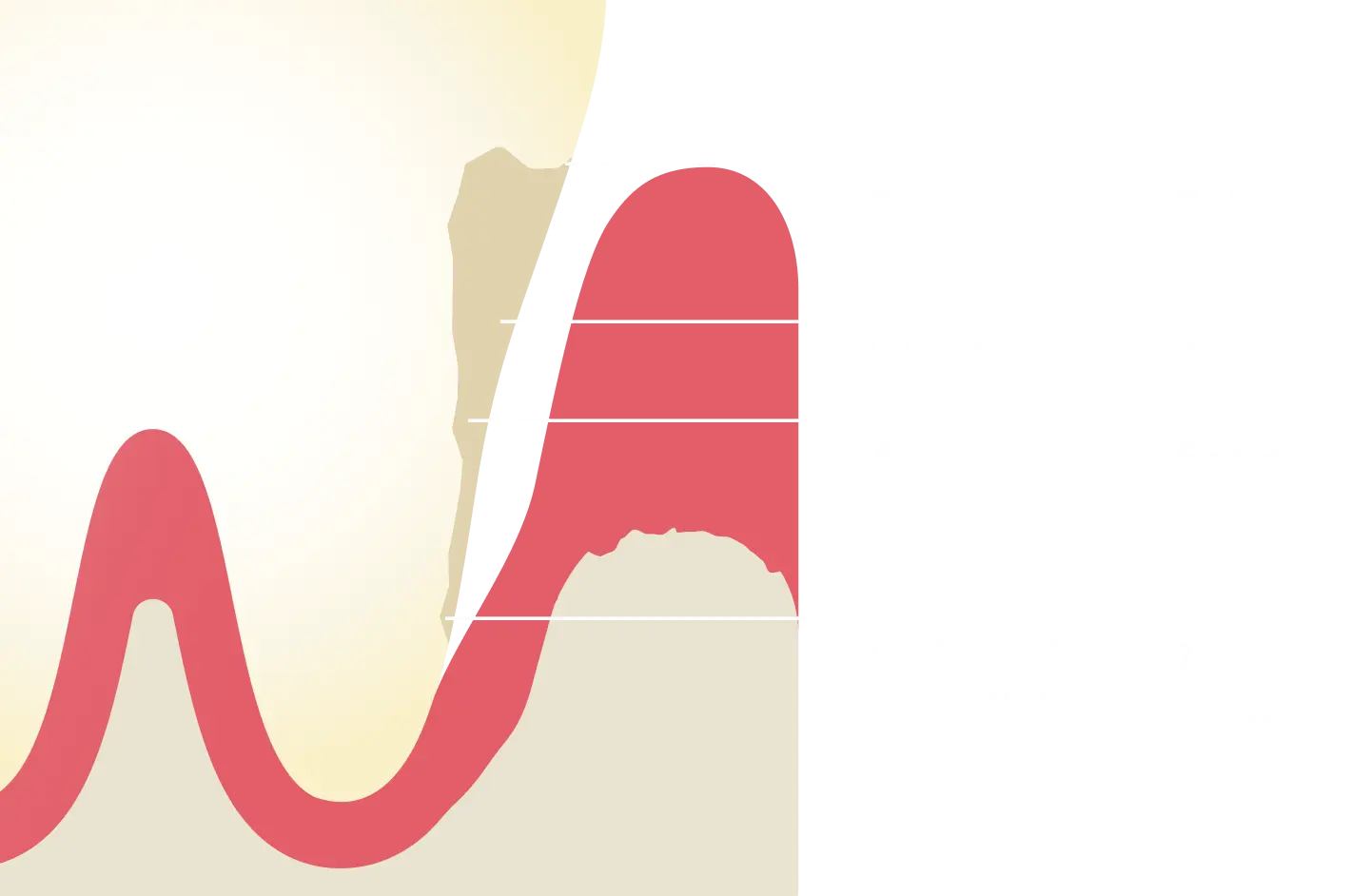
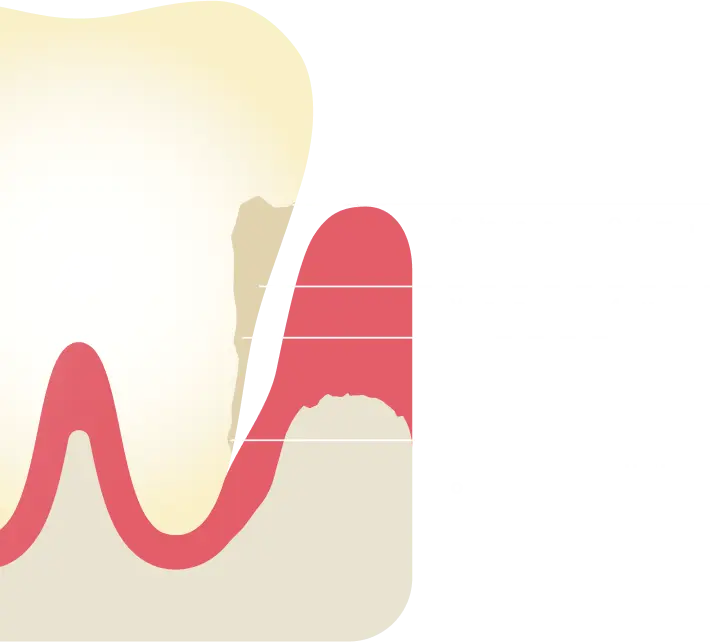
Why do gum pocket numbers matter?
The depth of the gum pocket, which is measured in millimeters, is a key indicator of healthy or damaged gums and ultimately, of gum disease. Pocket depth depends on the level of inflammation and infection. A gum pocket between 0-3 mm is considered safe, while a pocket more than 4 mm may signal gum disease (periodontitis).
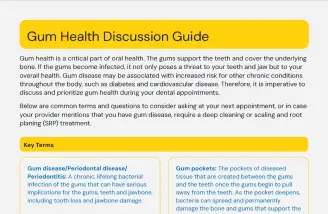
If you haven’t discussed gum pocket depth and gum disease with your dental professional, your next visit is the time to do so. Download our Discussion Guide to know what questions to ask at your next appointment.
How to protect your gums
Regular dental professional cleanings along with proper oral hygiene at home can help maintain the health of your gums.
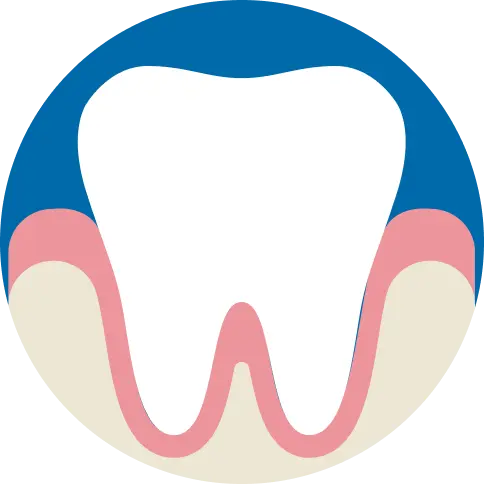
- Brush and floss twice a day, every day
- Drink plenty of water
- Avoid smoking
- Schedule regular dentist appointments.Visit our dentist finder to locate an office near you
However, if you notice any of these signs, which are associated with gum disease, see your dentist right away. Gum disease is a chronic condition that requires lifelong monitoring and treatment as needed, in partnership with a dental professional.

Bleeding
gums

Bad
breath
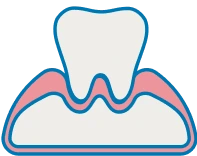
Red or
swollen gums
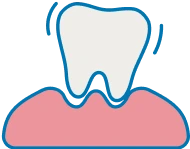
Tooth looseness
or loss
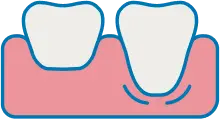
Receding
gums
However, if you notice any of these signs, which are associated with gum disease, see your dentist right away. Gum disease is a chronic condition that requires lifelong monitoring and treatment as needed, in partnership with a dental professional.

Bleeding
gums

Bad
breath

Red or
swollen gums

Tooth looseness
or loss

Receding
gums
If you have been told by your dental professional that you have deep gum pockets and/or gum disease, they may recommend a special cleaning and additional treatment, such as ARESTIN. Successful treatment can help reduce pocket depth which can support improved gum health.
ARESTIN is used in combination with scaling and root planing (SRP) procedures to treat patients with adult periodontitis (gum disease). ARESTIN may be used as part of an overall oral health program that includes good brushing and flossing habits and SRP.
Select Safety Information
Do not use ARESTIN if you are allergic to minocycline or tetracyclines, ask your dentist if you are not sure. Do not use ARESTIN in children, pregnant or nursing women as the use of tetracycline class drugs, including ARESTIN, during tooth development may cause permanent discoloration of the teeth.
Questions?
We’re here to help.
Contact our Customer Care team at 1-866-273-7846.
Contact our Customer Care team at 1-866-273-7846.
Monday - Friday, 8:30 am - 5:00 pm ET
You’re encouraged to report negative side effects of prescription drugs to the FDA. Visit www.fda.gov/medwatch or call 1-800-FDA-1088.
You’re encouraged to report negative side effects of prescription drugs to the FDA. Visit www.fda.gov/medwatch or call 1-800-FDA-1088.
What is ARESTIN?
What is ARESTIN?
ARESTIN® (minocycline HCl) Microspheres, 1mg is used in combination with scaling and root planing (SRP) procedures to treat patients with adult periodontitis (gum disease). ARESTIN® may be used as part of an overall oral health program that includes good brushing and flossing habits and SRP.
IMPORTANT SAFETY INFORMATION
- Do not use ARESTIN if you are allergic to minocycline or tetracyclines, ask your dentist if you are not sure. Do not use ARESTIN in children, pregnant or nursing women as the use of tetracycline class drugs, including ARESTIN, during tooth development may cause permanent discoloration of the teeth.
- ARESTIN may cause you to be sensitive to sunlight. Patients exposed to direct sunlight or ultraviolet light may develop a severe sunburn. At the first evidence of skin redness, call your dentist.
- Serious allergic reactions have occurred with oral minocycline. Get emergency help right away if you experience any signs of an allergic reaction including shortness of breath, swelling of the face, throat and tongue, rash, hives, itching, fever, or enlarged lymph nodes.
- Tetracyclines, including oral minocycline, have been associated with the development of autoimmune syndromes with symptoms such as joint pain, muscle pain, rash, swelling, fever, enlarged lymph nodes, and general body weakness.
- Tell your dentist about all the medicines you take, and about any health problems you have, including if you’ve had oral candidiasis (“thrush”).
- ARESTIN has not been studied in patients with weakened immune systems, such as patients with HIV infections or diabetes, or those receiving chemotherapy or radiation.
- The most frequently reported non-dental side effects were headache, infection, flu symptoms, and pain.
You are encouraged to report negative side effects of prescription drugs to the FDA. Visit www.fda.gov/medwatch or call 1-800-FDA-1088.
You are encouraged to report negative side effects of prescription drugs to the FDA. Visit www.fda.gov/medwatch or call 1-800-FDA-1088.
Please see full Prescribing Information here
What is ARESTIN?
ARESTIN® (minocycline HCl) Microspheres, 1mg is used in combination with scaling and root planing (SRP) procedures to treat patients with adult periodontitis (gum disease). ARESTIN® may be used as part of an overall oral health program that includes good brushing and flossing habits and SRP.
